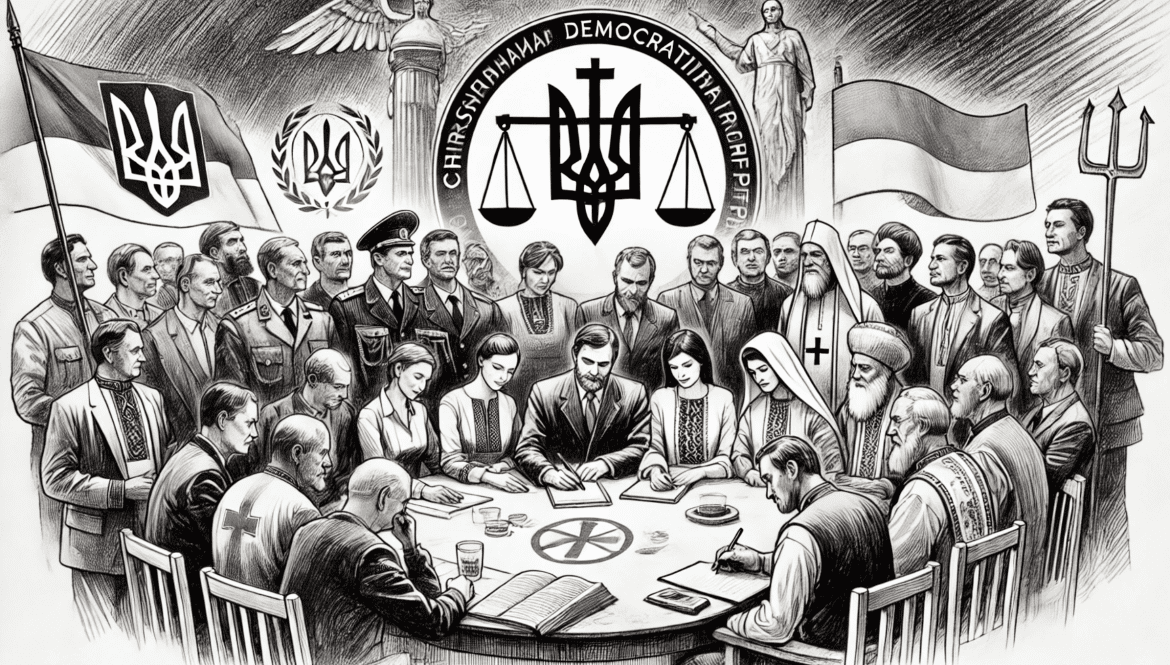Ukraine is at the crossroads of historic challenges that require not only effective political solutions but also a moral response to deep social upheaval. War, institutional weakness, moral devastation, and the search for national identity all create a need for a new political movement that combines values with responsibility, tradition with modernization. The Christian Democratic Party can become just such a project if it is built on solid foundations.
1. Ideological basis: personalism, responsibility, subsidiarity, solidarity
Christian democracy is not a religious party, but a political ideology that has its origins in Christian social teaching, but is adapted to a pluralistic, democratic and open society. Its foundation is personalism – the recognition of the dignity of each person as an autonomous and responsible being. It is a counterweight to both totalitarianism and relativistic individualism.
Political freedom is inseparable from responsibility: to one’s neighbors, to the community, to the state. That is why Christian democracy advocates subsidiarity – the transfer of authority to the lowest effective level – and solidarity – active participation in supporting the weak, rather than passive redistribution of resources.
2. Ukrainian context: why Christian democracy is relevant now
Most Ukrainians identify with Christian traditions. At the same time, there is a deep disillusionment with both leftist utopias and irresponsible liberalism that has led to the oligarchization of society. After the Revolution of Dignity and in the context of a full-scale war, society is striving for justice, dignity, and truth – values that are at the heart of Christian democracy.
Ukraine’s European choice also logically pushes for the establishment of the national Christian democratic tradition, as this ideology has been the basis of the EU’s political architecture since Robert Schuman, Konrad Adenauer, and Alcide de Gasperi.
3. Organizational structure: openness, transparency, dignity
The party should be built from the bottom up – on the basis of communities, local initiatives, Christian associations, the middle class, veterans, volunteers, and entrepreneurs. Its centers should not be just headquarters before the elections, but permanent centers of solidarity, education, and places where people meet with values.
Decisions should be made on the basis of internal democracy and open discussion. It is important to introduce mechanisms for ethical assessment of candidates, transparent financing, and public accountability of the leadership. The party should set an example of internal moral hygiene.
4. Political program: rebuilding on the basis of dignity
The Christian Democratic Party should offer society a specific program based on these principles:
- Dignity economy: support for social market economy, small business, farming, fair taxation, labor protection;
- The state as a service: public administration reform, decentralization, digitalization, and the rule of law;
- Social cohesion: fair pension and healthcare systems, family support, assistance to war victims, inclusive education;
- Moral politics: rejection of populism, culture of responsibility, fight against corruption as a moral evil;
- National identity: development of the Ukrainian language, culture, and historical memory without the extremes of nationalism;
- The European way: integration into the EU on the basis of common values, preservation of subjectivity.
5. Communication: clear, human, hopeful
The language of the party should not be bureaucratic or theological. It should be human, understandable, and honest. It should not intimidate, but inspire. Not to divide, but to unite. Not to promise everything, but to offer a way.
Christian democracy is the language of hope. At a time when Ukrainians are tired, confused, and wounded, they need a political force that not only knows what to do, but also why to do it. And which does not say: “Give us power,” but “Let’s become stronger together.”
6. Conclusion: time of establishment and time of validity
The time has come not only to talk about Christian democracy but also to build it as a political force. This should be a new type of party – not a club of functionaries, not a technical platform, not a fan club of an individual, but an instrument of moral and political revival. Christian democracy is not a nostalgia – it is a response to the future.




